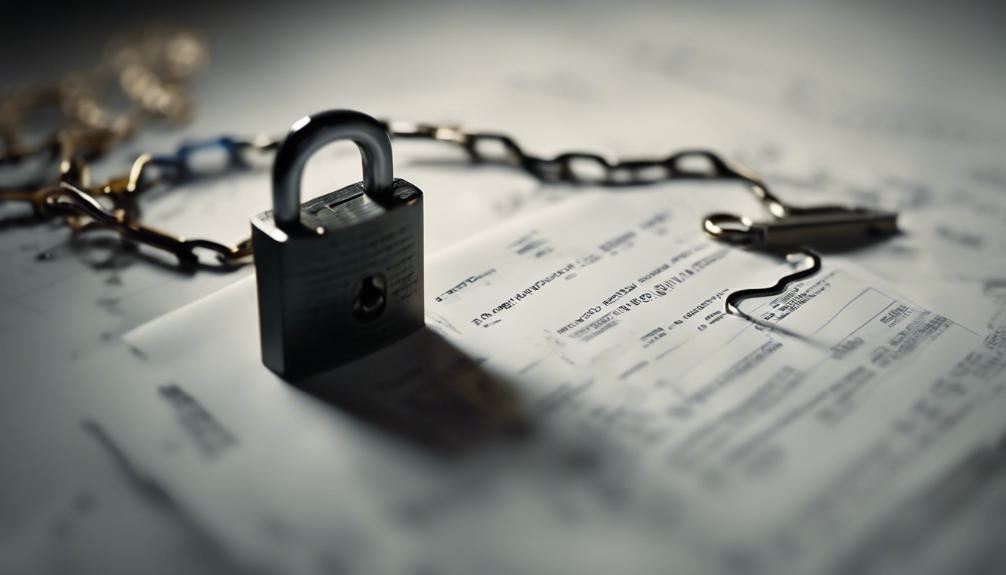Highmark Health Falls Victim to Phishing Scam
The recent cybersecurity breach at Highmark Health, where a sophisticated phishing scam compromised the personal information of approximately 300,000 individuals, serves as a stark reminder of the vulnerabilities within our healthcare systems. As we navigate through the complexities of this incident, it becomes imperative to examine the mechanisms of such attacks and the effectiveness of the responsive measures deployed by Highmark Health. This case not only highlights the insidious nature of phishing scams but also raises questions about the broader implications for the healthcare industry's digital security posture. What lessons can be drawn from this incident, and how can organizations bolster their defenses against similar threats in the future?
Key Takeaways
- Highmark Health experienced a data breach affecting 300,000 people due to a phishing attack.
- Sensitive information exposed includes SSNs, financial data, and protected health information.
- Immediate actions were taken, including enhanced email security and offering two years of credit monitoring.
- No evidence of misuse of the breached data has been identified yet.
Background of the Breach

In December 2022, Highmark Health suffered a significant data breach due to an email phishing attack, impacting approximately 300,000 individuals and exposing sensitive personal and financial information. This incident highlights the ever-present threat of cyber-attacks in the healthcare sector, demonstrating the importance of robust security measures and vigilance. Upon detection, Highmark Health acted swiftly to mitigate the breach's effects, focusing on protecting those impacted and preventing future incidents. Their response included immediate deactivation of the compromised mailbox, enhancement of email security controls, thorough employee training on cybersecurity, and resetting of passwords. Highmark Health's commitment to those affected extended to offering two years of complimentary credit monitoring services, showcasing their dedication to the well-being and security of their clients in the face of adversity.
Scale and Impact

Understanding the scope of the Highmark Health data breach reveals the extensive impact on affected individuals and the broader implications for data security in the healthcare sector. The breach, affecting 300,000 individuals, not only puts these persons at risk of identity theft but also exposes sensitive personal and financial information. The aftermath underscores the vulnerability of healthcare data and the devastating effects of security breaches on trust and privacy. Highmark Health's response, including enhanced security measures and offering credit monitoring, reflects a commitment to rectifying the situation and safeguarding against future incidents. Nevertheless, the breach serves as a stark reminder of the ongoing challenges in protecting health information and the critical need for vigilance and robust security protocols in the healthcare industry.
Phishing Attack Explained

The phishing attack on Highmark Health, executed via a deceptive email, led to unauthorized access of sensitive information, marking a significant breach in the company's cybersecurity defenses. Phishing, a method where attackers disguise themselves as trustworthy entities through electronic communications, aims to trick individuals into divulging confidential data. In this instance, the sophisticated nature of the phishing email not only compromised the integrity of Highmark Health's information systems but also highlighted the pervasive threat these attacks pose to organizations dedicated to serving the public's health and well-being. The incident underscores the critical need for continuous vigilance, robust security protocols, and exhaustive education on digital threats among employees, to safeguard against the exploitation of human vulnerabilities by cybercriminals.
Information Compromised

Highmark Health's data breach exposed sensitive personal and financial information, including group names, Social Security numbers, and financial data, putting thousands at risk. This incident underscores the critical importance of safeguarding personal data, especially within healthcare sectors where the impact can extend far beyond financial losses to include significant emotional distress and potential health risks. For individuals dedicated to serving others, this breach serves as a stark reminder of the vulnerabilities that exist and the need for relentless vigilance in protecting the information entrusted to us. The compromised data, integral to personal and financial security, places an immense responsibility on organizations to uphold the highest standards of data privacy and security, underscoring the trust individuals place in these entities.
Detection and Response

Upon detecting the breach on December 15, Highmark Health swiftly initiated a thorough response to mitigate the impact of the phishing scam on affected individuals. Recognizing the severity of the situation, the organization took immediate action by deactivating the compromised mailbox to prevent further unauthorized access. In a bid to support those potentially impacted, Highmark Health proactively offered two years of complimentary credit monitoring services, acknowledging the long-term risks of identity theft. Additionally, they commenced sending out notification letters to inform the affected parties, ensuring transparency and guiding them through the next steps. This prompt and considerate response highlights Highmark Health's commitment to the well-being of its clients, demonstrating a proactive stance in protecting their interests amid unforeseen challenges.
Security Measures Enhanced

In response to the email phishing attack, Highmark Health promptly implemented a series of enhanced security measures to fortify its email infrastructure and safeguard sensitive information. Recognizing the paramount importance of protecting the personal and financial data of their clients, the organization took decisive action. This included the immediate deactivation of the compromised mailbox, the establishment of stronger email security controls, and the initiation of thorough employee training programs focused on cybersecurity awareness. Additionally, Highmark Health instituted password resets across the board and deployed network blocking strategies to prevent further unauthorized access. These measures reflect Highmark Health's unwavering commitment to the security of its clients' data and its dedication to preventing future breaches.
Victim Support Offered

Recognizing the severe implications of the data breach, Highmark Health has extended thorough support to the affected individuals by offering two years of complimentary credit monitoring services. Understanding the vulnerabilities exposed by the incident, the organization is committed to mitigating its impact on those compromised. This proactive measure is designed to safeguard the financial and personal information of the victims, ensuring early detection of any possible misuse of their data. In addition to monitoring, Highmark Health is providing educational resources to help individuals understand how to protect themselves against identity theft, emphasizing their dedication to the well-being of those affected. By taking these steps, Highmark Health demonstrates a compassionate approach toward resolving the consequences of the breach and reinforcing trust with their clientele.
Potential Long-Term Risks

While the immediate response to the Highmark Health data breach includes thorough support measures, the potential long-term risks for affected individuals remain a significant concern. The exposure of sensitive personal and financial information could have far-reaching implications that extend well beyond the initial aftermath of the breach. For those dedicated to serving and supporting affected communities, it is essential to recognize that the repercussions of such incidents can subtly undermine the trust and security of countless individuals. The breach's impact may manifest in various unforeseen ways over time, potentially affecting the mental and financial well-being of those compromised. It underscores the importance of ongoing vigilance, support, and education to mitigate the long-term effects and restore confidence among those affected.
Identity Theft Concerns

The phishing scam at Highmark Health has escalated concerns over the long-term risk of identity theft for the 300,000 individuals affected. The exposure of sensitive personal and financial information has created a profound unease among the victims and the broader community dedicated to protecting individuals' rights and welfare. This incident underscores the necessity for thorough and effective protective measures to safeguard against the misuse of identities. It also highlights the challenges faced in promptly identifying and mitigating such risks, which can have lasting impacts on individuals' lives. The community focused on serving others is now more than ever committed to advocating for thorough strategies to prevent identity theft and to support those who have been affected by such breaches.
Complimentary Protections

In response to the phishing scam that compromised the personal and financial information of 300,000 individuals, Highmark Health has offered two years of complimentary credit monitoring and identity theft protection services. This proactive measure demonstrates Highmark Health's commitment to safeguarding the well-being of those affected by this breach. Understanding the potential crucial ramifications of identity theft, the organization seeks to provide peace of mind and a layer of security to those impacted. By implementing these services, Highmark Health not only addresses immediate concerns but also underscores its dedication to the ongoing protection and support of its community members. This gesture of responsibility and care is a crucial step towards restoring trust and ensuring the safety of personal and financial information in the wake of the breach.
Industry-Wide Breaches

Recent years have seen a disturbing trend in the escalation of data breaches across the healthcare industry, affecting millions of individuals and exposing a vast array of sensitive information. These incidents not only jeopardize the privacy and security of patients but also undermine trust in healthcare institutions. For those dedicated to serving others, the impact extends beyond mere data loss; it represents a profound breach of the ethical commitment to protect those in their care. In response, healthcare organizations are increasingly prioritizing the implementation of robust cybersecurity measures, recognizing the critical importance of safeguarding patient information. This shift towards enhanced security protocols and employee training underscores the industry's collective responsibility to prevent future breaches and maintain the sanctity of patient trust and confidentiality.
Legal Repercussions

Legal repercussions arising from data breaches, such as the Highmark Health phishing scam, have brought to light the severe consequences and liabilities companies face in the wake of such security incidents. The exposure of sensitive information puts companies at risk of legal action from affected individuals seeking restitution for the potential damage to their financial and personal security. Moreover, regulatory bodies may impose fines and require remedial actions to prevent future breaches, emphasizing the importance of stringent security measures and compliance with data protection regulations. For organizations dedicated to serving others, these legal challenges underscore the critical responsibility of safeguarding client information, not only to maintain trust but also to fulfill ethical and legal obligations towards the protection of sensitive data.
Preventative Recommendations

To mitigate the risk of future email phishing attacks, organizations should implement robust cybersecurity training for all employees. This training should not only educate staff on the latest phishing tactics but also instill a culture of caution when handling emails. Regular updates and simulated phishing exercises can reinforce this knowledge, making employees the first line of defense against potential breaches. Additionally, implementing advanced email filtering solutions can help catch fraudulent emails before they reach inboxes. Multi-factor authentication (MFA) for accessing sensitive systems adds an extra layer of security, ensuring that even if credentials are compromised, unauthorized access can be prevented. By taking these steps, organizations can significantly reduce their vulnerability to phishing scams, protecting both their data and the individuals they serve.
Frequently Asked Questions
How Can Affected Individuals Identify Phishing Attempts in the Future to Prevent Similar Breaches?
To mitigate the risk of future phishing attempts, individuals should exercise caution with unsolicited emails. Vigilance is key; always verify the sender's authenticity before clicking any links or providing personal information. Be wary of emails requesting sensitive data, as legitimate organizations rarely solicit such information via email. Implementing advanced email filters, regularly updating passwords, and participating in cybersecurity awareness training can further safeguard against phishing threats and enhance overall digital security.
What Specific Steps Should Individuals Take if They Notice Suspicious Activities on Their Accounts Following the Breach?
Individuals noticing suspicious activities on their accounts should act swiftly to mitigate potential risks. Initially, they should report any anomalous transactions to their bank or credit institution. Changing passwords and ensuring they are strong and unique is also vital. Engaging with credit reporting agencies to place fraud alerts on their profiles can further protect against identity theft. Additionally, affected persons ought to review their account statements meticulously and consider enrolling in credit monitoring services if not already provided.
Are There Any Legal Actions That Affected Individuals Can Take Against Highmark Health for the Breach of Their Personal Information?
Sailing through the stormy seas of data breaches, affected individuals seek a beacon of recourse against the tumult. Legally, those impacted by the unauthorized disclosure of personal information have the right to pursue litigation against the entity responsible for safeguarding their data, in this instance, potentially Highmark Health. Initiating a lawsuit for negligence or failure to protect sensitive information is a viable course of action. Consulting with legal experts specializing in data breach litigation is advisable to explore specific legal options and rights.
How Does This Breach Compare in Severity and Handling to Other Notable Healthcare Data Breaches in Recent Years?
In evaluating the severity and response to the breach experienced by a major healthcare provider, it is evident that while the incident affected 300,000 individuals, thorough measures were promptly enacted, including enhanced security protocols and free credit monitoring. This approach aligns with industry standards, yet the breach underscores the ongoing vulnerability within healthcare data security. Comparatively, the response mirrors efforts seen in other significant breaches, emphasizing the critical need for continuous improvement in cybersecurity practices.
Beyond the Two Years of Complimentary Credit Monitoring, What Additional Resources or Services Does Highmark Health Recommend or Provide to Help Individuals Protect Themselves From Identity Theft in the Long Term?
Beyond the two-year complimentary credit monitoring, it is recommended for individuals to remain vigilant by regularly reviewing their account statements and credit reports for any unauthorized activity. Additionally, they should consider placing fraud alerts on their credit files and exploring the option of a credit freeze. Engaging in these proactive measures can provide an added layer of protection against potential identity theft in the long term.
Conclusion
To summarize, the cybersecurity breach at Highmark Health serves as a stark reminder of the digital age's Achilles' heel: the vulnerability of sensitive data to phishing attacks. Despite the organization's swift response and the implementation of enhanced security measures, this incident highlights the ever-present specter of identity theft that looms large over the healthcare sector. It underscores an imperative need for an industry-wide elevation in cybersecurity vigilance, akin to building a digital fortress impervious to the ceaseless barrage of cyber threats.

This post has been generated by AI and was not reviewed by editors. This is Not legal advice. Please consult with an attorney.
